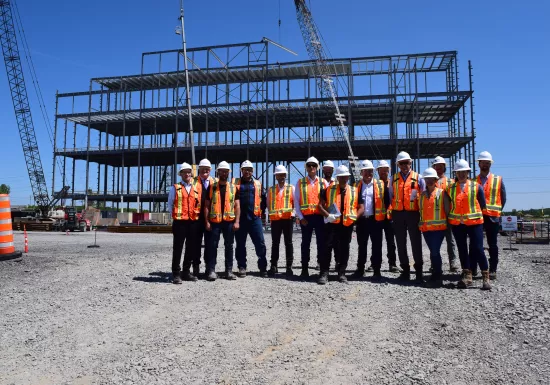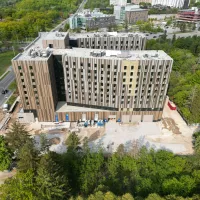

Over the next decade, the public and private sectors will invest massively in even larger and more complex projects. The country will see the construction of hospitals and seniors’ homes, housing and water treatment centres, sustainable transportation projects and renewable energy power plants- this alone will generate an unprecedented construction boom. The digital transformation alone will likely enable the construction sector to increase its productivity by up to 15% and reduce costs by 4 to 6%.
To accommodate the growth in the industry, general contractors are investing in innovation, health and safety, community relations, diversity, equity and inclusion, and sustainable building practices.
But what does this growth mean for the environment and Canadian communities?
The affects of climate change are already identifiable in our daily lives. The Intergovernmental Panel on Climate Change (IPCC) has warned that to avoid the most catastrophic impacts of climate change, global warming must be limited to 1.5 degrees Celsius.
The construction industry has a large role to play in this transition and things are changing for the better. For example, there is a growing demand for projects seeking sustainable certification. The industry—clients and contractors—are seeking to integrate environmental mitigation measures and to contribute more positively to ecosystems and communities.
There is also a trend in favour of circular economy. Construction and demolition waste generated by the Canadian construction industry represents 27% of all solid waste sent to landfills. More than 75% of this waste has residual value and could be recycled, recovered, or reused.
Today, we are launching our first Integrated report, a combination of our Activity report and Environment, Social and Governance (ESG) report. Last year, we outlined our ESG commitments and objectives through our platform, Perspective. This year, we are demonstrating how this plan has been put into action.
Read the report.
Our dedicated team of professionals are executing initiatives that reflect the six priorities outlined in last year’s ESG report: Climate Change, Circular Economy, Community Relations, Indigenous Relations, Diversity Equity and Inclusion, and a Culture of Innovation.
Here is a recap of our main targets, as set out in our 2021 ESG report:
2022
Hire an Indigenous Relations Advisor to implement a strategy that fosters the full participation of Indigenous peoples in our operations.
2022
Communicate our DEI statement of intent and roll out Respect and Civility training across all our operations.
2025
Electrify at least 75% of our site vehicles.
2025
Offer the traceability of residual materials to our clients across all our projects and adopt a target for the reduction and diversion of residual materials from landfills.
2030
Transition to a net-zero world by targeting a 40% reduction in Scope 1 and Scope 2 GHG emissions, using 2021 as the base year.
2030
Increase by 30% the number of building projects seeking green certification, compared with 2021 levels.
We recently became ISO 14001:2015 certified, which covers all our operations from coast to coast. This certification is one of the most internationally recognized environmental standards that an organization can use to standardize its environmental performance and ensure continuous improvement of its operations. Our environmental management system will help us achieve the targets and objectives outlined in the report.
As we continue to make the transition to a net-zero world and encourage industry players to do the same, we will apply innovative practices to our work. We invite you to read more about our progress over the past year in our Integrated Report.
Read the report.

